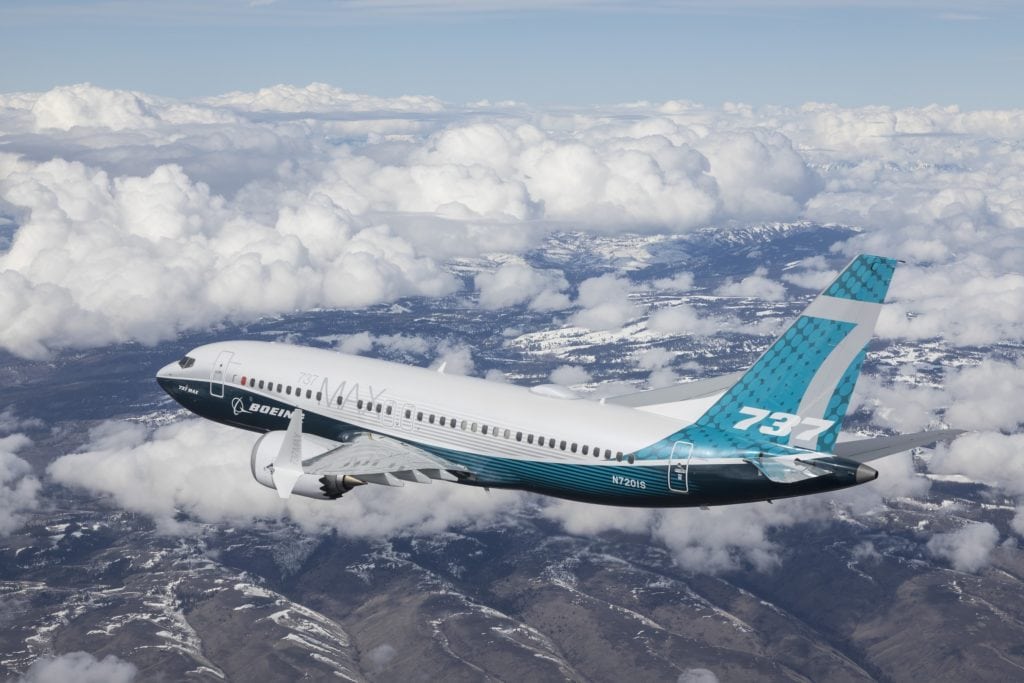
Boeing is recommending the use of flight simulator training for the return to service of the 737 MAX. Photo: Boeing
In a statement posted to its website, Boeing is recommending the use of flight simulator training to accompany the return to service of its grounded 737 MAX fleet, which is a change from previous statements the manufacturer has made about the aircraft.
Grounding of the 737 MAX will officially reach the 10-month mark next week, after separate Ethiopian Airlines and Lion Air flights crashed and killed a combined 346 passengers and crew onboard. When the MAX first entered into service in 2017, because of its similarities to the previous generation 737 Next Generation, no simulator training was required—an aspect of the aircraft program that has come under scrutiny civil aviation regulatory officials and experts investigating the two crashes.
“Boeing is recommending 737 MAX simulator training in addition to computer based training for all MAX pilots prior to return to service of the 737 MAX. This recommendation takes into account our unstinting commitment to the safe return of service as well as changes to the airplane and test results. Final determination will be established by the regulators,” the company said in a statement published to its website.
The statement marks the first time Boeing has publicly advocated for the use of flight simulator training to accompany the MAX’s return to service, as the company spent most of 2019 focusing on a software update designed to correct the functionality of the aircraft’s maneuvering characteristic augmentation system (MCAS). Boeing has not provided details yet on how it would envision flight simulator training occurring for 737 MAX pilots, and whether airlines or the company itself would fund such training.
According to a section of Boeing’s website dedicated to 737 MAX updates, nearly 90% of MAX operators have participated in simulator sessions featuring the MCAS software update that is still under review. The decision not to require simulator training for 737 MAX pilots when the aircraft was first entering into service was also driven by by Boeing’s desire to save airlines money on the cost of such training.
Simulator training was one of the key points highlighted by the Southwest Airlines Pilots Association when it filed a lawsuit in October against Boeing alleging that the MAX grounding has caused its pilots to potentially lose more than $100 million in compensation. The pilots group indicated that if the FAA had required simulator training on the MAX, Boeing had agreed to provide Southwest with up to $1 million per MAX aircraft it received.
The simulator training recommendation is the latest in a series of steps the company has taken over the last month toward returning the MAX to service. In December, former Boeing CEO Dennis Muilenburg resigned, to be replaced by David Calhoun, who previously served as chairman of Boeing’s board of directors. Calhoun is to officially assume the chief executive role starting next week, while Chief Financial Officer Greg Smith has occupied the role in the transition period.
Prior to the CEO change, Boeing announced its decision to temporarily suspend 737 MAX production, and prioritize the delivery of the 400 newly manufactured aircraft it has produced since the grounding started. Those aircraft have been in storage awaiting regulatory approval on return to service.
“Public, customer and stakeholder confidence in the 737 MAX is critically important to us and with that focus Boeing has decided to recommend MAX simulator training combined with computer-based training for all pilots prior to returning the MAX safely to service,” Calhoun said.